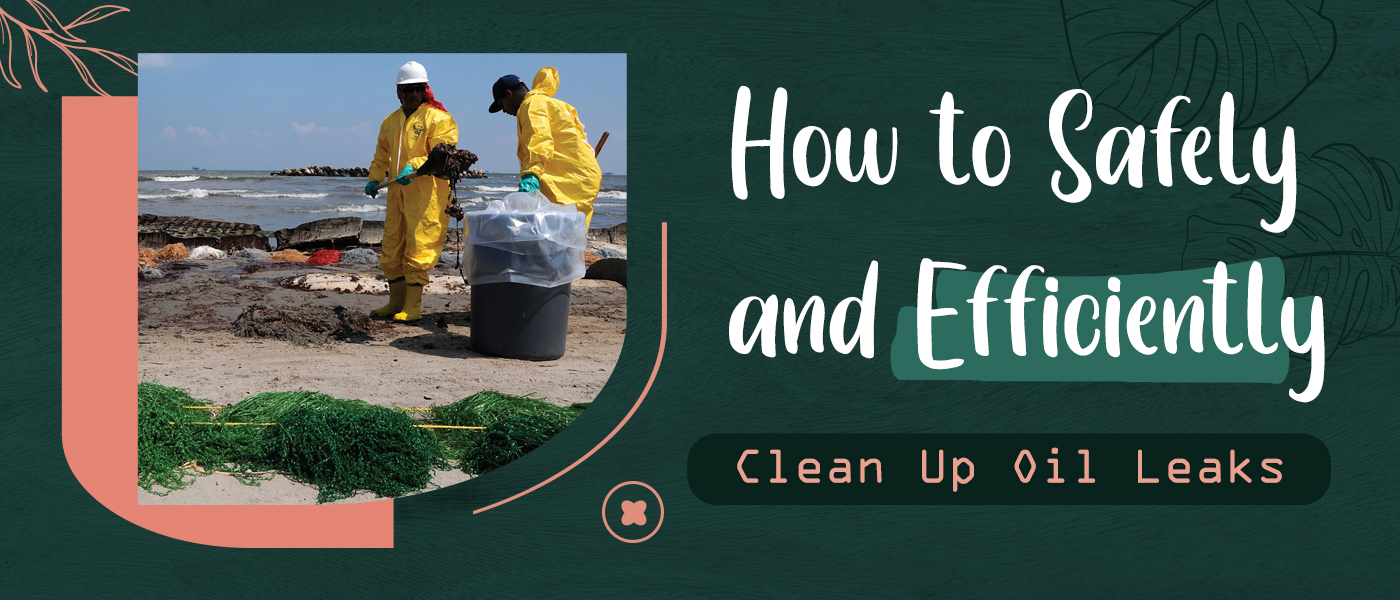How to Safely and Efficiently Clean Up Oil Leaks

In factories, garages or even at commercial and domestic buildings, oil is an essential component serving different purposes. It can be used as fuel for heavy machineries, cooking, maintenance support – the list goes on. But with the extensive use of oil, oil based products comes the risk of spills and leaking. As useful as oil is, their leakage is extremely damaging for the environment as well as human lives.
Oil spills can cause damage to the environment even after the surface is cleaned because residues tend to seep in and contaminate the soil. The right way to clean oil spills without further damaging the environment is a crucial knowledge for all. In this blog, we have outlined in detail the proper method to reduce the risks of contamination, fire hazards and staining.
Understanding Oil Spills For Extensive Cleanup
The efficiency of cleaning oil depends on a number of factors. Oil is not just one substance and it has varying properties making it harder to clean. Additionally, the area where the oil leakage has occurred impacts the quality of cleaning. So, it is essential to understand all these factors before embarking on the task of cleaning spilled oil. All of these qualities help in assessing the proper method for cleaning oil leakages.
The type of oil typically used in a workplace setting is Petroleum. It is a chemical compound that is hydrocarbon-based, dark in color, and insoluble in water. Oil is mostly used in the workplace as lubricant (engine or motor oil) or as fuel (by converting crude oil into gasoline, diesel, kerosene, benzene, etc.). Oil is also used in domestic setups for heavy machineries such as the heater or boiler.
Oil is a highly volatile and viscous substance making it a spreading fire hazard. Being a highly flammable liquid, spilled oil needs to be handled quickly ensuring that no trace amount is left behind. Leaking oil also emits toxic fumes making it a health hazard for everyone involved.
Methodical Approach For a Safe Oil Spill Cleanup
The last thing you want when an oil or chemical leak occurs in your company or backyard is for unskilled individuals to try to help by going to the scene. Additionally, you don’t want to ignore the spill and continue working around the spill ignoring the dangers of spilled oil.
You should implement your spill response plan right away as soon as a spill is discovered at your location. Notifying the appropriate (trained) organisations, obtaining the chemical’s Safety Data Sheet, and donning appropriate PPE are typically necessary for this.
Safety First
Before attempting to clean the oil spill, any one approaching the region needs to have protective gear. A complete PPE suit is always recommended in this case. This should include protective eyewear, nitrile gloves, protective clothing and footwear, and breathing apparatus to keep the toxic fumes away.
After you have donned your safety clothing, now you may tackle the oil spill. A step-by-step approach makes sure that you check all the boxes for cleaning all the oil and not just the surface.
Arrest the Spread of Oil
- Act Quickly to Contain the Spill – In order to stop an oil spill from spreading across the workplace, quick action is required as soon as it happens. The essential procedures will depend on the size of the spill, but in every case, speed is crucial.
- Deploy Spill Control Equipment – Install absorbents, like mats or pillows, and spill control equipment across the impacted area if it is safe for staff to do so. Booms can also be used to contain spills and stop them from getting farther into the workplace.
- Prevent Environmental Contamination – Make sure that all stormwater systems, sewers, and drains are closed off or plugged to reduce environmental hazards. This will lessen the likelihood that the oil may contaminate the surrounding area.
- Notify Emergency Services if Necessary – You should definitely call for help from experts to come and assess the damage because in many cases only the surface seems clean but the oil seeps through the soil affecting the environment.
Isolate and Remove Ignition Sources
All kinds of ignition sources need to be carefully removed from the surroundings. The hazardous flames move fast occupying every area. If there are flammable objects in its path then the whole thing could blow up.
Cleaning up The Contaminated Region
With the help of the right tools such as shovels to remove the affected area, bioremediation products to break down the oil particles will efficiently remove all the oil from the contaminated regions leaving no residues.
Disposing off the toxic chemicals
- Adhere to Appropriate Disposal Guidelines
To gather and dispose of the chemicals that have spilled and any contaminated things, use the waste disposal bags that are included with your oil spill kit. It’s critical to manage and get rid of all waste in an environmentally responsible way.
- Work with Licensed Contractors for Waste Disposal
To ensure safe disposal of chemical waste along with dirty absorbent materials, clothing, and other items used in the cleanup process, get in touch with qualified trash disposal contractors.
Conclusion
Oil spills are dangerous and need to be addressed quickly. Following all the steps outlined in this blog, you can easily rid yourself of the spilled chemical. Thus, protecting yourself and others from fire hazards, toxic fumes and long-term environmental damage. We cannot highlight enough how important following safety guidelines are in this situation. ALways remember to put on protective gear to approach a cleaning.

Spilltech Environmental
Welcome to Spilltech Environmental Ltd, your premier destination for cutting-edge oil spill cleanup services in Ireland. With our headquarters based in Monaghan, we pride ourselves on being pioneers in the industry, offering unparalleled expertise and innovative solutions for handling oil spillages of any scale.

